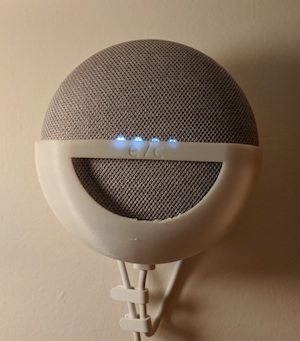I love Google Assistant, and really love Google Home. I’ve talked about how it’s THE virtual digital assistant you should choose when setting up you smart home and how it’s years more advanced than any of the other competition.
I followed all the leaks and even Tweated about how I was going to buy a Google Home Mini the first day it came out, even though I already had two Google Homes.
I have 2 @Google Home's already and will 100% be buying a Google Home Mini when they come out. pic.twitter.com/7KtU0GXJtd
— Alan James (@AlanJames1987) September 21, 2017
Well, unfortunately the Google Home Mini is not what I was hoping for and not because I was expecting too much.
Expectations
Let’s get this out of the way: I was not expecting the Google Home Mini to sound good or be able to detect my voice as well as it’s bigger sibling, the Google Home. However, this was the only way that the Google Home Mini actually exceeded my expectations. It sounds better than a standard Amazon Echo, which costs more than 3x more when released, and can hear me as clearly as my Google Homes.
So what don’t I like about it? Well, basically everything else.
The Touch Controls
Google talked about how the Mini would have a capacitive touch top, just like the Google Home. You could adjust the volume by touching the sides and long press the top to issue a query or command.
However, shortly after I purchased my Mini Google it came out that there was a bug with the capacitive touch top. Many Google Home Minis were activating themselves without being touched or spoken to. This is because capacitive sensors detect and respond to electromagnetic interference. This allows the small amount of electromagnetic field your finger generates to control things like your phone. This also means that a capacitive sensor can be activated by specific electromagnetic field being generated by the device itself, which is something manufacturers 100% know how to correct for if proper testing takes place.
Because this was so widespread and would cause massive privacy concerns Google disabled the top touch control with a fireware update.
This means you can’t pause music with a tap or deactivate the Google Home Mini once the wake word has been said.
This seems fine on the surface but when using the Mini in an office it causes you to seem incredibly rude.
Often people will come into my office while I’m listening to music but rather than tapping the top of the device and seeming attentive and welcoming I seem frustrated and distant. To stop the music I have to speak to it, wait for it to hear the wake word, then speak my command, and finally wait for it to respond. This is all while the person entering my office forms the subconscious idea that I care more about conversing with my stupid new toy than I do conversing with them.
Contrast that to my Google Home, where when someone enters my office my tapping of the device instantly pauses the music and allows them to instantly talk. This shows that I care what they have to say and will take quick action to stop what I’m doing to hear them.
The Volume Controls are BACKWARDS! Sometimes… Let me explain.
I’ve seen people 3d printing mounts to mount Google Home Minis on walls. If you do this you will most likely face the cable downwards, to plug it into an outlet, but then the volume controls would be upside down.
“But Google doesn’t intend you to mount it on walls” I hear you thinking and yes you’re right. But when you make a circular device it has no clear way to be used, unless it can be viewed only one way, like a watch. But Google Home Mini has no clear direction it’s facing, unless you look at the cable, but because a cable can function from any angle it’s not really a clear indication of it’s direction.
What they really need are configurable volume directions.
The Mute Control
Hopefully you’re seeing a pattern to my frustrations: the controls of Google Home Mini suck.
Unlike the Google Home, which uses a momentary switch for muting the microphone, the Mini uses a slide switch. This might seem fine but the awkward location of the switch and the wrap around volume touch controls means that you will inevitably change the volume when trying to mute and unmute.
This is a minor complaint, but compared to the Google Home this just feels very unintuitive.
Should You Get One?
If you can accept the above complaints or are on a budget then the answer is yes. The Google Home Mini is a great device for the $50 price tag. But if you already have a Google Home expect the Google Home Mini to not quite feel familiar and possibly be frustrating at times.

Leave a Reply
You must be logged in to post a comment.